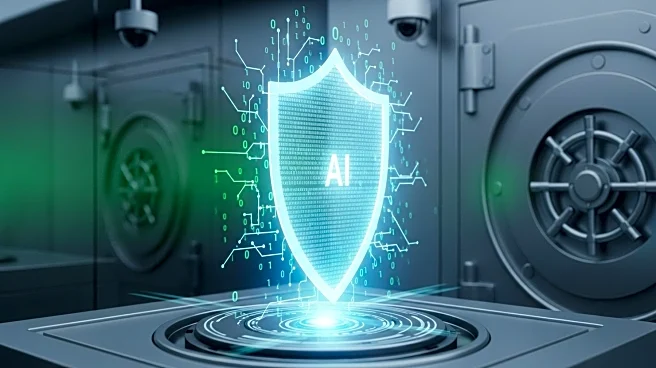What's Happening?
Financial service firms are increasingly relying on artificial intelligence (AI) to counteract the growing sophistication of cyber threats, particularly ransomware attacks. These attacks have evolved from being conducted by small, isolated groups to becoming highly organized and professionalized operations. Ransomware actors now specialize in various stages of the attack process, from identifying victims to exploiting vulnerabilities and negotiating with victims. AI is being utilized by these actors to enhance their capabilities, making attacks faster and more complex. In response, financial institutions are adopting AI-driven solutions to identify vulnerabilities, prevent attacks, and recover swiftly when breaches occur.
Why It's Important?
The use of AI in cybersecurity is crucial for financial institutions as they face increasingly sophisticated threats. By leveraging AI, these institutions can better protect sensitive data and maintain trust with their clients. The professionalization of ransomware actors poses a significant risk to high-value industries, including finance, making it imperative for these firms to stay ahead in the AI arms race. Effective AI solutions can help detect and mitigate threats before they cause significant damage, thereby safeguarding the financial sector's stability and reputation.
What's Next?
Financial institutions are expected to continue investing in AI technologies to enhance their cybersecurity measures. This includes improving access management through multifactor authentication and conditional access restrictions, as well as training helpdesk teams to better validate user identities. As AI-driven attacks become more prevalent, firms will need to refine their detection capabilities to identify signs of compromised accounts, such as 'impossible travel' scenarios. The ongoing development and deployment of AI solutions will be critical in maintaining a robust defense against evolving cyber threats.
Beyond the Headlines
The integration of AI in cybersecurity not only addresses immediate threats but also raises ethical and legal considerations. As AI systems become more autonomous, questions about accountability and transparency in decision-making processes emerge. Additionally, the reliance on AI could lead to a shift in workforce dynamics, requiring new skills and roles within cybersecurity teams. The long-term implications of AI adoption in this field may influence regulatory frameworks and industry standards.











